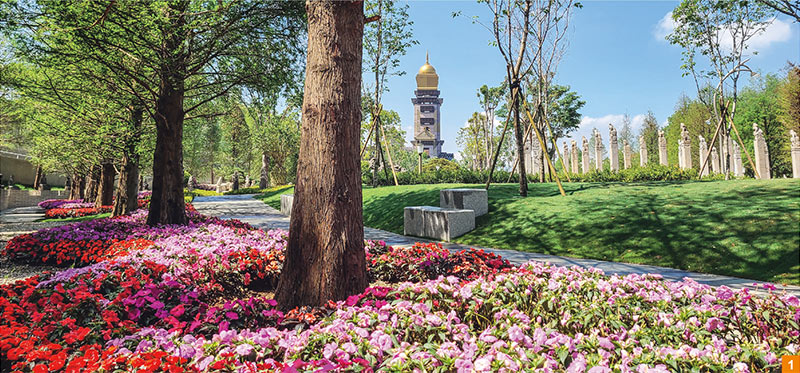Chris Quinsee (Fa Chuan)
Although I write this more than two months after the pilgrimage ended (I went over to China to spend 6 weeks working in Ningbo) the events and impressions of those two weeks are still clear in my mind.
First, I want to say ‘thank you’ to the Shifus. It was not only a privilege to go to Chung Tai Chan, but it made me focus on the meaning of the Dharma and how it is intimately connected to an ethical and moral life. I had the opportunity to take the 5 Precepts and the Vows together with pilgrims from all over the world. For me, this was the most important event in the whole journey.
As well, let me mention the people I travelled with – my fellow pilgrims – as any journey is as much about one’s fellow travelers as it is about places and events. We all got on remarkably well and the spirit of kindness and helpfulness pervaded the whole trip. Being one of the non-Chinese pilgrims on board, I appreciated the hard work of our English interpreters -Yvonne and Serene – who translated the Shifus’ words (although Shifu often spoke English for the benefit of the ‘Laowai’). My own Chinese was helpful at times but not up to the standard of our interpreters. By the way, as I have had to be a Japanese interpreter I know it is harder than most people think to pull out the right words and phrases, especially when the subject is a technical subject like Buddhist Dharma!
As we travelled mostly by bus (except for a short train journey around the coast of Hualian) virtually the whole length and breadth of Taiwan, one should mention the untiring and skillful driving of the bus drivers who got us safely to and from our destinations. Having experienced some pretty hair-raising bus journeys in China (and surprisingly in Japan back in the old days), I thought these drivers deserved whatever merit comes their way for looking after us.
Incidentally, Taiwan is very beautiful and deserves its old Portuguese name of Formosa (beautiful). It is basically a rugged and mountainous island with a coastal plain at the edges. The far southern region verges on the tropical and the rest of the island is verdant, sub-tropical forest. When we visited the temple overlooking the scenic Sun Moon Lake, there was a tropical downpour of monsoon proportions. Mercifully, the rest of the journey was blessed with comfortable weather and we were spared the possible excitement of any typhoons which might pass through at that time of year.
Next, let me make a few observations about the meditation schools we visited on our journey and the people we met there. One thing impressed me wherever we went and that was the sincerity and commitment of the locals. Of course, they laid on the food and gave us gifts to remember our visit but what struck me most was their dedication to the practice of meditation and the living of the Dharma. We visited many of these meditation centers in various places as we travelled through Taiwan and the folk we met were all examples of living the Dharma.
One great highlight of the pilgrimage was meeting members of one of the Aboriginal groups of Taiwan – a people totally different in ethnicity and culture from the predominant Han Chinese. We danced together (well I just shuffled….) and were presented with gifts of their handicrafts. As I understand it these people had been assisted by the Abbess of the local monastery following the recent big earthquake in the region. I think it was their way of saying ‘thank you’.
Finally, the days spent at Chung Tai Chan in meditation and recitation of the sutras (and chopping cabbages for dinner more or less mindfully) amid the stunning backdrop of the monastery and its grounds culminated in the ceremony conducted by the Abbot of Chung Tai. That was when we took our precepts and received our Dharma names while dressed in our black and brown robes (again my thanks to Yvonne who had to help me get dressed as I was all two left arms and elbows putting them on and even worse in folding them up afterwards!).
There were many other memorable times and places and experiences that I could mention but those are best kept written in the heart for personal reflection. If there was anything that for me was somewhat difficult to handle it was the food. Not, I hasten to add, was the quality a problem for me but just the sheer quantity of it! Despite the vegetarian fare, I swear I gained weight on the journey which was probably the least expected outcome. Of course, not a morsel was allowed to be wasted so I guess that is not surprising.
In conclusion, I will end these reflections with recollection of the pond in the grounds of Chung Tai Chan Monastery, surrounded by many beautiful trees and rocks and life generally by quoting a famous 17 Century Japanese poet called Basho. His 17 syllable Haiku are justifiably treasured for their Zen-like inspiration and appreciation of life as it is in its essence. Seeing things just as they are, without grasping or attachment, mindful of the transience of all phenomena and all experiences in life. This one comes to mind as I remember a final walk around that pond which I took before we left. Basho says:
An ancient pond
A frog jumps in
The sound of water

